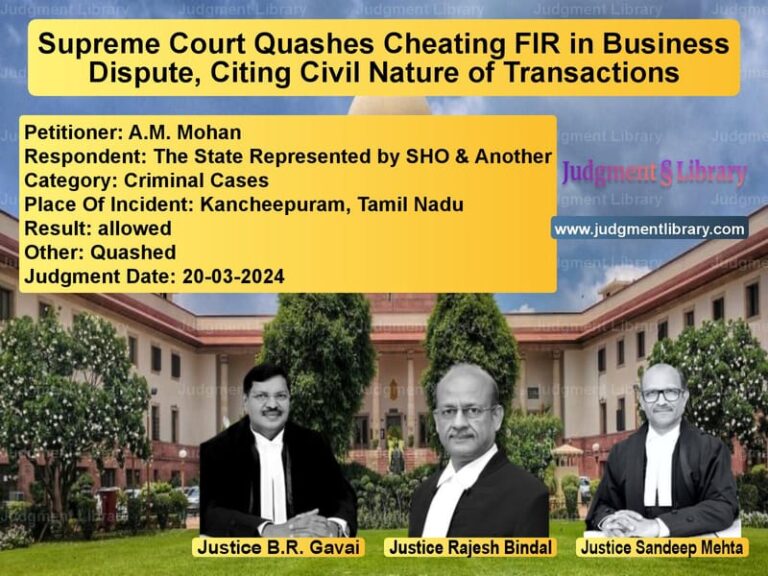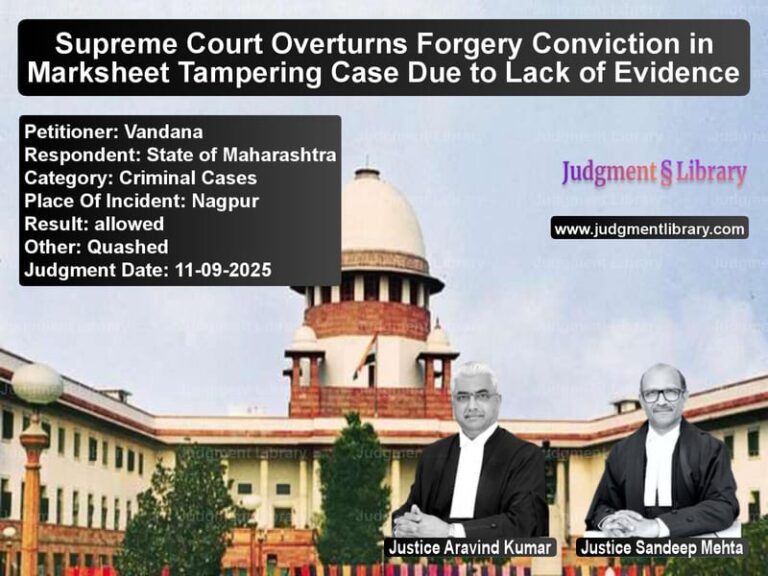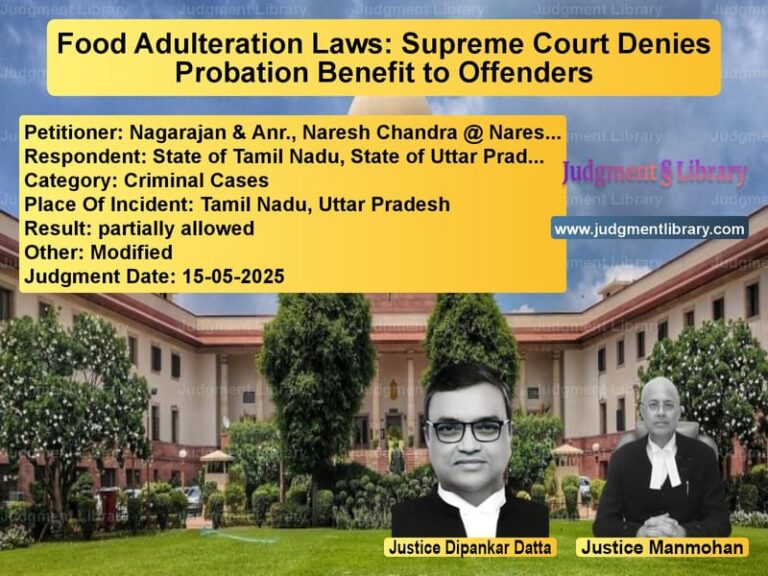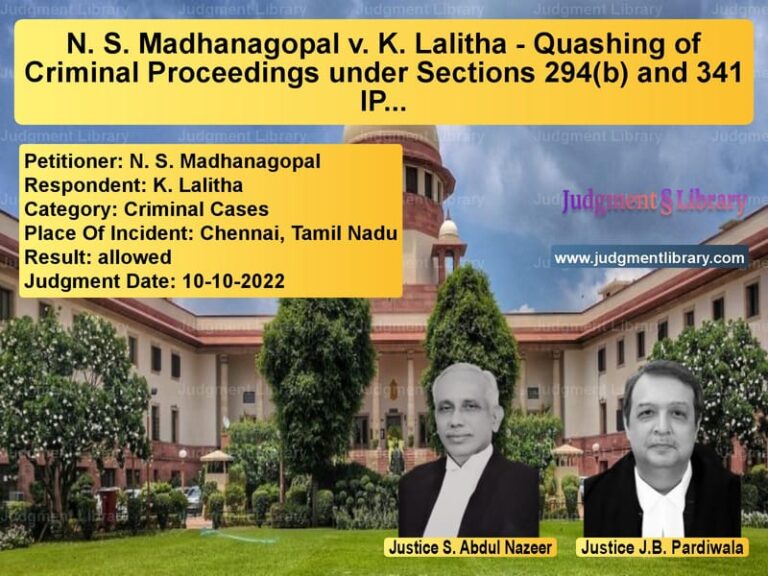Supreme Court Rules on Mega Power Policy and Fiscal Benefits in Power Projects
The case of Nabha Power Limited & Anr. vs. Punjab State Power Corporation Limited & Anr. involves a dispute regarding the applicability of fiscal benefits under the Mega Power Policy for power projects in India. The Supreme Court of India, in its judgment dated November 5, 2024, ruled that a press release announcing modifications in the Mega Power Policy did not constitute a legal change, and the benefits under the policy became applicable only after the official notifications were issued.
Background of the Case
The dispute arose from the Punjab State Power Corporation Limited’s (PSPCL) decision to deny certain fiscal benefits under the Mega Power Policy to Nabha Power Limited (NPL), a subsidiary of L&T Power Development Limited. The case centered around whether the changes in the policy were effective from the date of a press release issued on October 1, 2009, or from December 11, 2009, when an official notification under the Customs Act was issued.
The Appellate Tribunal for Electricity (APTEL) had earlier ruled in favor of PSPCL, rejecting NPL’s claim that the press release itself altered the legal framework. The Supreme Court upheld this decision, clarifying that only legally notified changes could be considered a ‘change in law’ under the terms of the Power Purchase Agreement (PPA).
Key Legal Issues
- Whether the press release of October 1, 2009, announcing modifications to the Mega Power Policy constituted a legal change.
- Whether fiscal benefits under the policy should apply from October 1, 2009, or from the date of official notification on December 11, 2009.
- Whether PSPCL was justified in denying fiscal benefits based on the delayed official notification.
Petitioner’s Arguments
Nabha Power Limited argued that:
- The press release issued by the Government of India on October 1, 2009, clearly announced modifications to the Mega Power Policy.
- They had factored in the benefits from the policy modifications while submitting their bid on October 9, 2009.
- Since the modifications were approved by the Cabinet, they should be considered as binding legal changes.
- The delay in issuing the formal notification should not impact their entitlement to the benefits.
Respondent’s Arguments
The Punjab State Power Corporation Limited countered with the following points:
- The press release was merely an announcement and not a legally binding order.
- The legal change only occurred when the customs notification was issued on December 11, 2009.
- The company’s claim that it had factored in the benefits before the official notification was speculative and had no legal basis.
- The benefits should be passed on to consumers as per the contract terms.
Supreme Court’s Observations
The Supreme Court analyzed the validity of the press release as a source of law and made the following key observations:
1. Press Release Does Not Constitute Law
The Court held that a press release summarizing Cabinet decisions does not have the force of law. The judgment stated:
“The press release of October 1, 2009, merely announced the Cabinet’s decision and did not enact, adopt, promulgate, amend, or repeal any existing law. It lacked the force of law and could not be relied upon to claim fiscal benefits.”
2. Legal Change Requires Official Notification
The Court reaffirmed that fiscal benefits under the Mega Power Policy were granted through statutory notifications under the Customs Act. The judgment emphasized:
“A notification under Section 25 of the Customs Act is required to bring such changes into effect. The legal change occurred only on December 11, 2009, when the necessary notification was issued.”
3. Contractual Interpretation and Change in Law
The Court examined the Power Purchase Agreement (PPA) between the parties and determined that the definition of ‘change in law’ required an official amendment, which did not occur until December 2009. The judgment noted:
Read also: https://judgmentlibrary.com/legal-implications-of-the-byjus-insolvency-case-a-supreme-court-review/
“The words of clause 13.1.1 read with the definition of law in Clause 1.1 of the PPA clearly indicate that a mere press release does not constitute a change in law.”
Final Judgment
The Supreme Court ruled in favor of the Punjab State Power Corporation Limited and held:
- The press release of October 1, 2009, did not constitute a change in law.
- The official change in law occurred only on December 11, 2009.
- The fiscal benefits under the Mega Power Policy were not applicable before the official notification.
- The appeal by Nabha Power Limited was dismissed.
Impact of the Judgment
This ruling has significant implications for contractual and regulatory interpretation in India’s power sector:
- It reinforces that only legally notified changes can be considered under contract terms.
- It ensures that companies cannot rely on government press releases to claim financial benefits.
- It provides clarity on the implementation of policy changes in the power sector.
By upholding the APTEL’s ruling, the Supreme Court has reinforced the principle that regulatory and fiscal changes must be implemented through proper legal channels, ensuring certainty and consistency in policy implementation.
Petitioner Name: Nabha Power Limited & Anr..Respondent Name: Punjab State Power Corporation Limited & Anr..Judgment By: Justice B.R. Gavai, Justice Prashant Kumar Mishra, Justice K.V. Viswanathan.Place Of Incident: Punjab.Judgment Date: 04-11-2024.
Don’t miss out on the full details! Download the complete judgment in PDF format below and gain valuable insights instantly!
Download Judgment: nabha-power-limited-vs-punjab-state-power-c-supreme-court-of-india-judgment-dated-04-11-2024.pdf
Directly Download Judgment: Directly download this Judgment
See all petitions in Company Law
See all petitions in Corporate Compliance
See all petitions in unfair trade practices
See all petitions in Judgment by B R Gavai
See all petitions in Judgment by Prashant Kumar Mishra
See all petitions in Judgment by K.V. Viswanathan
See all petitions in dismissed
See all petitions in Quashed
See all petitions in supreme court of India judgments November 2024
See all petitions in 2024 judgments
See all posts in Corporate and Commercial Cases Category
See all allowed petitions in Corporate and Commercial Cases Category
See all Dismissed petitions in Corporate and Commercial Cases Category
See all partially allowed petitions in Corporate and Commercial Cases Category







